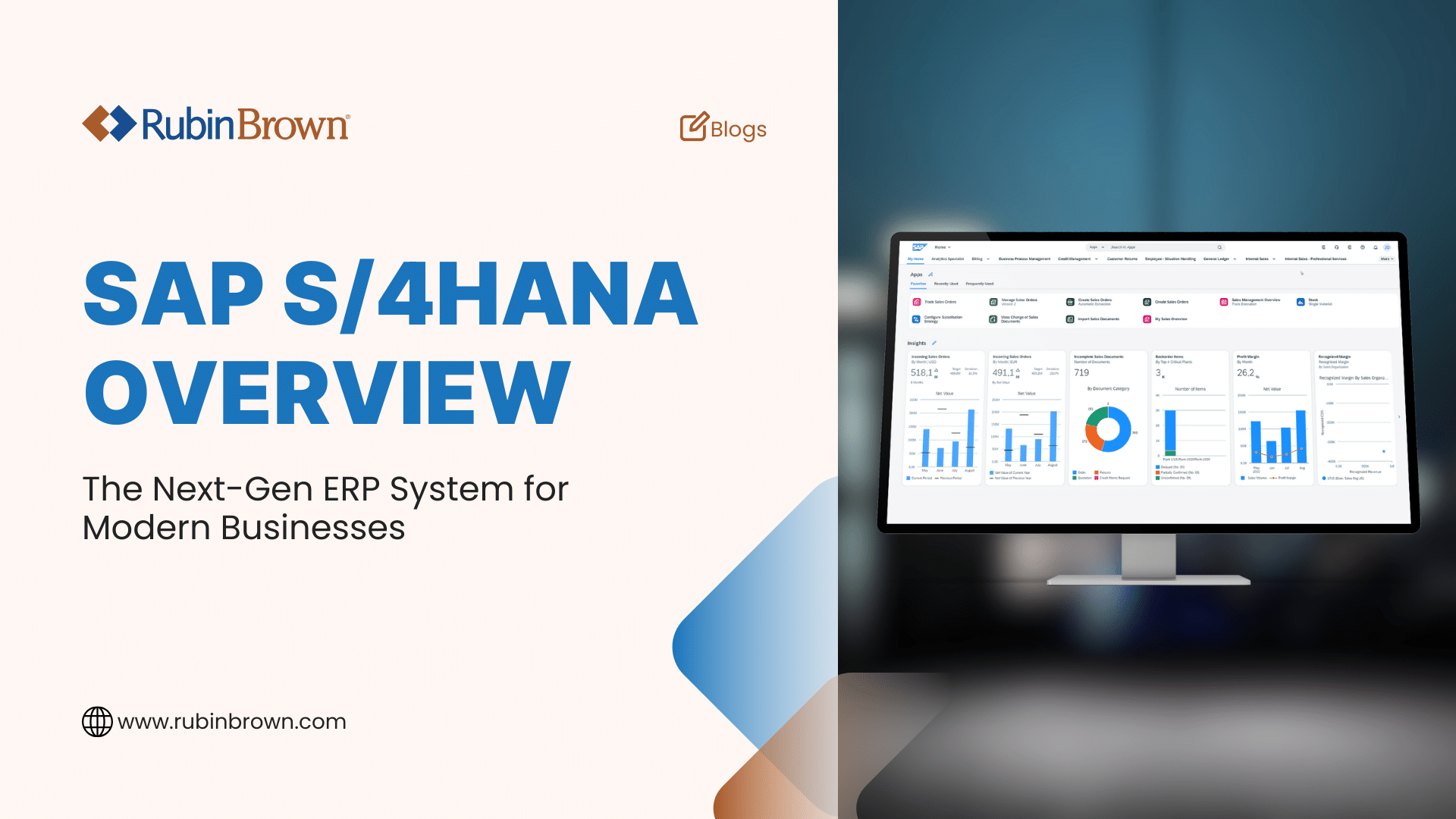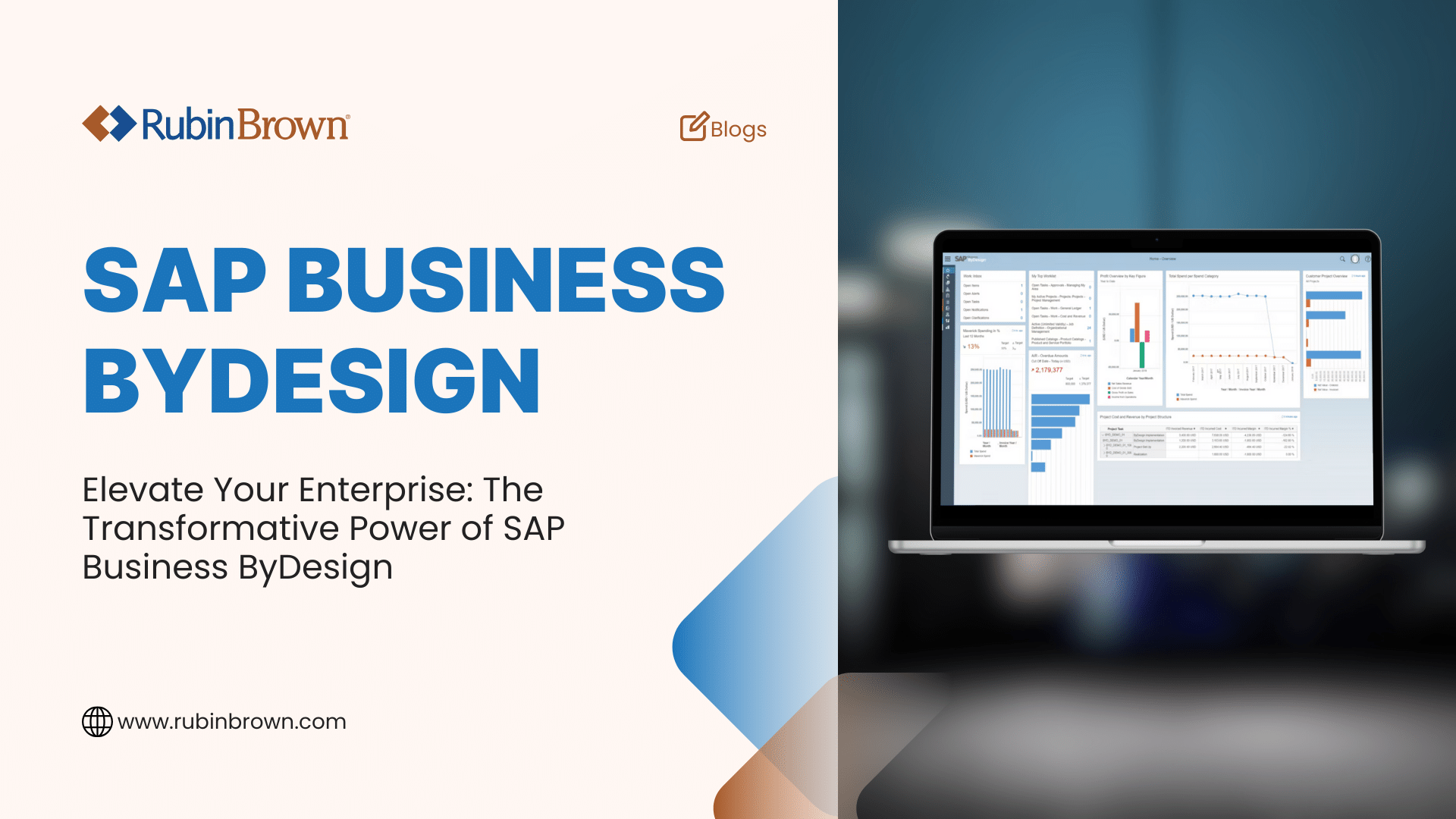1 min read
SAP Business ByDesign: An Overview
In the business world, SMEs are actively seeking ways to streamline their operations, boost efficiency, and drive growth. This search has led many to...

When it comes to managing and growing a business in today's fast-paced environment, having the right tools and systems in place is essential. SAP S/4HANA, a modern Enterprise Resource Planning (ERP) solution, has the potential to significantly transform the way organizations operate. In this blog post, we'll take an unbiased look at SAP S/4HANA, examining its key features, advantages, and industry applications. By exploring how this technology can streamline processes, provide real-time insights, and support digital transformation initiatives, we aim to help businesses make informed decisions about whether SAP S/4HANA is the right fit for their unique needs and goals.
SAP S/4HANA is the latest generation of SAP's Enterprise Resource Planning (ERP) software suite, designed to run on SAP's in-memory database, SAP HANA. This cutting-edge solution offers a simplified user experience, enhanced performance, and real-time data processing capabilities. With its simplified architecture and unified codebase, SAP S/4HANA eliminates data redundancy and reduces complexity compared to its predecessor, SAP ECC.
By leveraging the power of SAP HANA's in-memory computing capabilities, SAP S/4HANA enables faster data processing, real-time analytics, and improved decision-making. The software suite comes with the SAP Fiori user interface, offering a modern, intuitive, and role-based user experience across various devices, including desktops, tablets, and smartphones. SAP S/4HANA also features embedded analytics capabilities, allowing users to gain insights and make informed decisions in real-time, directly within their business processes.
One of the key advantages of SAP S/4HANA is its integration of intelligent technologies such as Artificial Intelligence (AI), Machine Learning (ML), and the Internet of Things (IoT). These technologies enable process automation, predictive analytics, and enhanced user experiences, helping organizations to stay ahead in the digital age. SAP S/4HANA can be deployed either on-premises or in the cloud, offering flexibility based on an organization's IT strategy and infrastructure preferences.
SAP S/4HANA offers industry-specific solutions and best practices for various sectors, such as manufacturing, retail, healthcare, and financial services, among others. The software suite is modular, allowing organizations to implement specific functional areas as needed, and supports extensibility through the SAP Cloud Platform and integration with third-party applications.
Covering a wide range of business processes, including finance, procurement, sales, manufacturing, supply chain, and human resources, SAP S/4HANA aims to help organizations simplify their IT landscape, improve operational efficiency, and drive digital transformation initiatives.
SAP S/4HANA is designed to meet the modern enterprise's needs, anchored by SAP's HANA in-memory computing for rapid data processing and real-time analytics. This foundation enables high-speed operations and instant business insights, critical for timely decision-making.
The system incorporates advanced analytics and reporting directly into business processes, providing live insights across all modules. This approach eliminates the need for separate data warehousing, ensuring decisions are based on the latest information within the workflow.
A key innovation is SAP S/4HANA's simplified data model, which reduces data redundancy and system complexity. This not only enhances performance but also makes system management and upgrades more straightforward, lowering overall costs. Coupled with the Fiori user interface, it offers a user-friendly experience that boosts adoption and productivity.
SAP S/4HANA integrates emerging technologies like AI, machine learning, and IoT directly into its core processes. This integration enables automation, predictive analytics, and adaptability to market trends, optimizing operations such as inventory management and asset maintenance.
The system is highly customizable, with a wide range of options and extensions to fit various industry needs. This flexibility ensures SAP S/4HANA can support unique business processes and challenges across sectors.
It promotes collaboration and integration, enhancing communication within organizations and with external partners. Its compatibility with other SAP and third-party solutions via the SAP Cloud Platform expands its functionality, creating a unified enterprise ecosystem.
Built with mobility in mind, SAP S/4HANA's Fiori interface ensures a consistent and intuitive user experience on all devices, supporting work from anywhere. This combination of speed, integrated analytics, simplicity, technological integration, customization, collaboration, and mobility positions SAP S/4HANA as a transformative tool for businesses navigating the digital era, driving efficiency and growth.
SAP S/4HANA is a versatile ERP solution that caters to the distinct needs of various industries by offering customized functionalities to drive efficiency, innovation, and growth. Its flexibility ensures that businesses across different sectors, including manufacturing, retail, finance, services, public sector, and utilities, can tailor the system to their specific requirements.
For the Manufacturing Sector: SAP S/4HANA enhances supply chain, production processes, and product lifecycle management. It supports real-time inventory management, predictive maintenance, and streamlined operations, reducing costs and improving quality and market speed. Integration with IoT devices offers deeper operational insights for better decision-making.
Retail Industry Insights: Retailers benefit from SAP S/4HANA's analytics, CRM, and omnichannel capabilities, enabling a comprehensive understanding of customer behaviors, effective inventory management, and personalized shopping experiences. This leads to optimized offerings, improved sales, and increased loyalty.
Finance Sector: In finance, it offers robust financial management and reporting tools for real-time performance insights, streamlined operations, and regulatory compliance, aiding in risk management, cash flow optimization, and strategic planning.
Healthcare and Service Industry: Service industries, including healthcare, utilize SAP S/4HANA for project management, HR, and customer engagement, improving project efficiency, workforce optimization, and customer satisfaction. Healthcare providers see advancements in patient care, streamlined operations, and integrated data management.
Public Sector: The public sector and utilities benefit from its support for regulatory compliance, budgeting, and asset management. It enhances public administration, grant management, citizen services, and enables smarter grid analytics and energy management, promoting sustainability and efficiency.
Beyond these sectors, SAP S/4HANA serves industries like agriculture, mining, and transportation, adapting to different business models and supporting global operations with its scalable, flexible ERP solutions. By offering industry-specific functionalities and insights, SAP S/4HANA helps organizations across the board achieve operational excellence and sustainable growth in the digital era.
The Pros: Embracing Innovation and Efficiency
One of the standout features of SAP S/4HANA is its intuitive and user-friendly interface, powered by SAP Fiori. This role-based, responsive, and streamlined design has been widely praised for improving productivity, reducing errors, and providing a better experience for the next-generation workforce. Additionally, S/4HANA offers a range of innovative solutions and functionalities, such as Intelligent Business Process (IBP), Integration Suite, and the green ledger. These features can empower enterprises with advanced analytics, process automation, and sustainability initiatives, driving operational excellence and competitive advantage.
The cloud versions of S/4HANA, including the Public and Private Editions, provide scalability and flexibility, allowing businesses to leverage modern cloud technologies like AI, RPA, and big data analytics. This can enable agility, cost optimization, and seamless integration with other cloud-based solutions.
The Cons: Navigating Challenges and Resistance
While SAP has embraced a cloud-first strategy, some enterprises, particularly larger ones in regions like Germany, have expressed resistance to this approach. Many prefer on-premises deployments, citing concerns over customization and control over their data and processes. Migrating to S/4HANA can also be a complex and challenging endeavor. Enterprises may face issues such as data errors, insufficient testing, and process documentation challenges, leading to delays, cost overruns, and disappointing results, as experienced by some organizations.
Effective data management is crucial for leveraging S/4HANA's insights capabilities. However, tasks like archiving, cleansing master data, and remediating custom tables can be time-consuming and resource-intensive, adding to the overall complexity of the implementation. Building a solid business case for the costs and complexity of implementing S/4HANA can be challenging as well. Enterprises must carefully evaluate the potential return on investment (ROI) and develop a clear roadmap to maximize the benefits of this transformative solution.
As with any significant technological shift, the decision to adopt SAP S/4HANA requires careful consideration of both its advantages and potential drawbacks. By weighing the pros and cons, businesses can make an informed choice that aligns with their strategic objectives, operational requirements, and long-term goals.
As an independent ERP selection consultant, I would advise any organization considering SAP S/4HANA to carefully evaluate the solution in the context of their unique business requirements and digital transformation goals. While SAP S/4HANA offers a range of powerful features and benefits, it's essential to understand the role of the SAP partner ecosystem in ensuring a successful implementation and long-term success.
The SAP partner ecosystem is a robust network of companies that bring diverse expertise and capabilities to the table. System Integrators (SIs) play a critical role in implementing and integrating SAP solutions, helping customers navigate the complexities of SAP projects. Value-Added Resellers (VARs) offer a combination of SAP software resale and additional services, providing industry or region-specific expertise. Independent Software Vendors (ISVs) develop complementary or extension applications that can enhance SAP functionality to meet niche or industry-specific needs.
When considering SAP S/4HANA, it's crucial to evaluate the availability and strength of SAP partners in your region or industry. Managed Service Providers (MSPs) can offer ongoing support and management of SAP systems, freeing up internal resources to focus on core business activities. Specialty Service Providers bring deep expertise in specific aspects of SAP implementation, such as data migration or user experience design. Education Partners are valuable resources for training and certification programs, helping organizations build the necessary SAP skills in-house.
Moreover, it's worth engaging with Influencer Partners, such as industry analysts, thought leaders, and user groups, to gain valuable insights and guidance throughout the ERP selection and implementation process. These partners can provide independent perspectives on SAP S/4HANA and help organizations make informed decisions.
We recommend that organizations carefully consider the strength and relevance of SAP partners in their specific context, as these partnerships can significantly impact the success of their digital transformation initiatives with SAP S/4HANA.
When considering SAP S/4HANA as your ERP solution, it's crucial to understand the pricing and licensing options available. SAP offers various licensing models depending on your deployment preference and business requirements. For on-premises deployments, perpetual licensing is the traditional model, where customers pay a one-time upfront fee for the software license and an annual maintenance fee. Pricing is based on the number of users or cores, and additional fees may apply for database licenses, middleware, and other components.
In contrast, SAP S/4HANA Cloud editions (Essential and Extended) follow a subscription-based licensing model. The Essential edition is a standardized, multi-tenant offering with lower entry costs and faster implementation, while the Extended edition provides more flexibility and customization options at a higher cost. Cloud pricing is based on a per-user, per-month subscription fee, which includes infrastructure, maintenance, and updates.
Some organizations opt for a hybrid approach, combining on-premises and cloud deployments, resulting in a mix of perpetual and subscription licensing models. It's also important to consider indirect access licensing, which applies when third-party systems or custom applications access SAP data or functionality. SAP has introduced a "Document-Based Pricing" model for indirect access, charging based on the number of documents created or processed.
User-based licensing is another aspect to consider, with SAP offering different user types (e.g., Professional User, Limited Professional User, Employee User) that have varying access rights and pricing. Customers need to determine the appropriate mix of user types based on their business requirements.
To obtain accurate pricing information tailored to your organization's specific needs, it's essential to engage with SAP sales representatives, partners, or licensing experts. They can help you understand the various licensing options, discounts, and negotiation possibilities. Additionally, consider the total cost of ownership (TCO) when evaluating SAP S/4HANA pricing, which includes software licensing costs, implementation, customization, training, and ongoing support expenses. Experienced SAP partners can help you develop a comprehensive understanding of the TCO and make informed decisions based on your budget and business objectives.
Choosing the right Enterprise Resource Planning (ERP) solution is critical for a company's future growth, operations, and scalability. ERP advisory firms, such as RubinBrown's Business Advisory Services (BAS) team, offer invaluable expertise and an objective viewpoint that often surpasses vendor-provided insights. ERP selection firms possess deep experience across industries, guiding businesses with ERP solutions that align with your unique needs, industry requirements and business objectives.
One of the primary benefits of engaging with an ERP advisory firm is their unbiased analysis. They focus on finding the best fit for the client, without pushing a particular vendor's solution. Their expertise also plays a crucial role in risk mitigation, identifying potential issues early and recommending strategies to minimize them.
Collaborating with an ERP selection team can result in substantial cost savings by steering clear of ill-fitting systems, unnecessary modifications, and avoiding implementation pitfalls. Their strong negotiation abilities frequently secure more favorable pricing and terms from vendors, enhancing the overall value proposition for a new ERP system.
The decision to implement a new ERP system is too important to leave to chance. Partnering with an ERP evaluation team ensures expert advice, unbiased analysis, and strategic planning, making it an investment in your company's long-term success. Begin your ERP conversion journey with the team at RubinBrown today.

1 min read
In the business world, SMEs are actively seeking ways to streamline their operations, boost efficiency, and drive growth. This search has led many to...
.png)
4 min read
ERP (Enterprise Resource Planning) discussions include Business Transformation at an increasing rate. Transformation may sound impressive – or...

6 min read
…and does it really apply to me? Organizations often find themselves in the position of replacing or upgrading their Enterprise Resource...